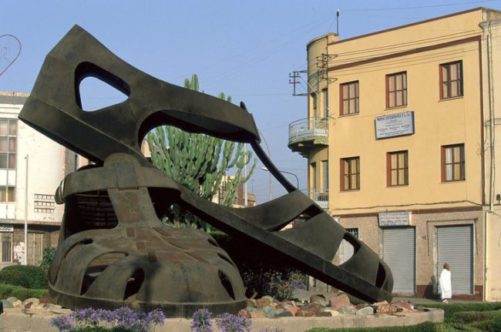May 24, 2016 marks the 25th anniversary of Eritrean independence. At moments such as these, it is important to remember the ties that bind us together as a people and a nation. Thousands of Eritreans fought and died in our improbable struggle for independence. Over 99 percent cast their ballot for an independent state. A new generation has labored to rebuild the country and defend Eritrean land. Today, we remain a people deeply appreciative of our martyrs and resolute in our support of Eritrea as an independent nation. This is as it should be.
Yet we should also acknowledge that Eritrea at 25 is a nation with fissures. This is particularly true in the diaspora, where extreme political polarization has become a fact of life. On this website, we have called attention to this issue at regular intervals. The Eritrean Diaspora Network, above all else, stands for healing the rifts within the diaspora and bridging this cancerous divide. Much work remains.
Nowhere are these fissures in the diaspora more evident than in the manner in which we choose to celebrate this most esteemed occasion. Celebrating Eritrea at 25 now means segmenting ourselves into our separate political camps; some in the diaspora will attend a party with political affiliation X, others will attend a function with political affiliation Y. Some will travel to Eritrea to celebrate the occasion, and for a subset of this group, this will be a statement of political preference; others have declined to travel home in an act of political protest. This is an unfortunate reflection of the times in which we now live.
These fissures are also reflected in the obvious stocktaking that occurs when nations arrive at important milestones. Many will regard Eritrea at 25 as a moment to celebrate “achievements” and “progress.” Those of a different political persuasion, consider it a time to catalogue “failures” and “missed opportunities.” A few simply see it as a moment for quiet introspection about where we are as a nation and where we might go. And of course, opportunities for dialogue between these competing perspectives are few and far between.
However one chooses to mark this important milestone in Eritrea’s history, we should use it as an opportunity to recognize two basic realities. The first is that while we may sit on different sides of the political spectrum, we are all in the nation building process together. Reconciliation is therefore not a choice for the diaspora but a requirement. And it is possible because our history shows us that we are a charitable and forgiving people. But reconciliation is also not guaranteed. This means that in engaging in political sparring today and tomorrow, we should understand that some lines of human decency should not be crossed. We should treat our fellow citizens as we would treat our family members.
The second reality to recognize is that nation building requires citizens that are stakeholders, not bystanders. Whatever your political views, apathy and disengagement is not an option, because social progress – however you envision it – requires active citizenship. While the political polarization of the day is regrettable, retreating to our private corners is probably worse. Eritrea at 25 should remind us that nations are not built by sitting on the fence. Like our forbearers, we have an individual responsibility to build Eritrea in the image that we desire. So learn, engage, and be active. Its what our history demands!
Happy 25 Years Eritrea!


Such messages should be viral all over media & around cummunities. Appreciate your positive outlook in not only reminding us, but also what is needed to work toward common goal to prevent familiar outside threats & bring the needed change or improvement inside by Eritreans ONLY.
Happy 25th Silver Jubilee Hagerey